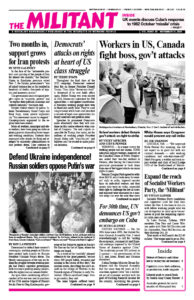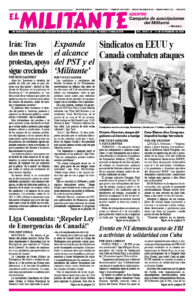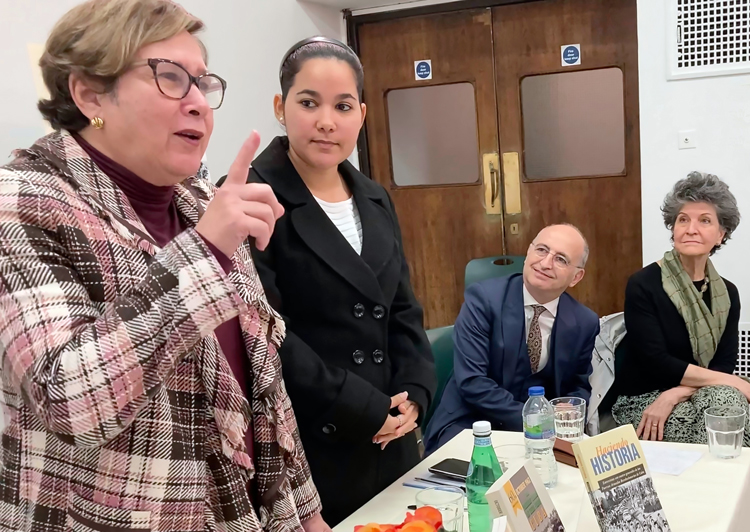LONDON — In October 1962, Washington pushed the world to the edge of nuclear war as it drove to overturn the Cuban Revolution. Meetings in Manchester and London marked the 60th anniversary of what has become known as the Cuban Missile Crisis.
“The Missile Crisis is the most dangerous incident that has occurred in the relationship between Cuba and the United States,” Cuban Ambassador Bárbara Montalvo told the events. “We knew through its long history of attacks that the U.S. was considering a full-scale invasion.” The U.S. government used Moscow’s decision to deploy nuclear missiles to Cuba to impose a naval blockade of the island.
Accepting missiles from the Soviet Union was an act of solidarity by the Cuban government, Montalvo said. At the time, Washington had stationed nuclear missiles in Turkey and Italy. Cuba “considered it a sovereign right to have the type of weapons it deemed appropriate, but never considered the missiles necessary to our defense.”
The meetings drew a total of 120 people. Speakers also included: Antoni Kapcia, emeritus professor at University of Nottingham; Miriam Palacios, a leader of the group Cubans in the U.K.; and Jonathan Silberman, director of Pathfinder Books, which sponsored the meetings. He is a member of the Central Committee of the Communist League.
Two books published by Pathfinder Press were featured at the meetings: October 1962: The ‘Missile’ Crisis as Seen From Cuba by Tomás Díez, a member of Cuba’s Revolutionary Armed Forces at the time, and Making History: Interviews with Four Generals of Cuba’s Revolutionary Armed Forces. Díez sent greetings from Havana, encouraging participants to “learn the causes of the crisis” and “draw the lessons.”
“That means starting with the conquest of political power by Cuba’s toilers,” Silberman said. “Through their socialist revolution Cuba’s workers and farmers became actors in history, transformed themselves and set a powerful example for working people around the world.”
Cuban leader Fidel Castro noted that Washington “began preparing their war on us five months after the triumph of the revolution following the agrarian reform,” Silberman said.
“The new government gave land titles to 100,000 peasants,” he said. “It embarked upon electrification of the whole country. It strove to raise the cultural and educational level of the toilers; to draw women into productive work and into the revolution’s leadership; and to uproot racism. It led working people to expropriate the entire capitalist class.
“It strengthened the worker-peasant alliance, raising their political consciousness and drawing them into running the country. The Cuban Revolution marked the renewal of communist leadership in the Americas and internationally,” Silberman said.
In response, Washington engaged in attacks and sabotage, Montalvo said, including the April 1961 mercenary invasion at Cuba’s Playa Girón. The invasion was defeated in 72 hours as millions backed action by Cuba’s armed forces and militias.
The October Crisis the next year was a product of the U.S. government’s defeat, Antoni Kapcia told the Manchester meeting. The John F. Kennedy administration made overthrowing the revolution its top priority. “All else is secondary — no time, money, effort or manpower is to be spared,” U.S. Attorney General Robert Kennedy said.
The U.K. government “backed Washington’s course,” Silberman said. “Prime Minister Harold Macmillan described Fidel Castro as ‘the very devil’ who ‘has to be got rid of.’ He agreed to a secret deal with Washington that the British-controlled Bahamas could be used to launch airstrikes on Cuba. His government publicly endorsed the naval blockade imposed by Kennedy.”
‘War of the entire people’
“The whole country mobilized in defense” said Montalvo, who was 13 at the time. “A great sense of danger, and yet a lot of calm. A lot of determination in ordinary people.” Montalvo and Palacios recounted what that meant for their families. “My father and brother joined the militias. They went to the Escambray mountains to fight counterrevolutionary bandits,” Montalvo said.
“My mother put on the green uniform of the Ministry of the Interior, a gun at her hip,” Palacios said, “and my father went to a special school. Everybody was involved — each to their post. We were not afraid, we just carried on with everything — the literacy campaign, the vaccination campaign.”
In the face of this “war of the entire people,” as it is known in Cuba, Kennedy halted well-advanced invasion plans. Pentagon officials told him to expect 18,500 U.S. casualties in the first 10 days, more than in the first five years of fighting in the Vietnam War.
Lively discussion followed presentations at both meetings. Eight students of U.S. foreign policy from Manchester University came with their teacher. One of them said he was shocked to hear the Cuban government learned of Soviet Premier Nikita Krushchev’s decision to withdraw the missiles over a news broadcast. The student asked about Cuba’s exclusion from talks between Moscow and Washington. “Kennedy gave a commitment to Khrushchev not to invade Cuba,” Kapcia noted.
“We do not believe in mere promises of nonaggression. We need deeds,” the Cuban government had responded at the time. Montalvo explained that Havana presented demands that remain unresolved to this day: end the economic blockade, all subversive activities, pirate attacks, and violations of Cuba’s air and naval space; and withdraw U.S. forces stationed at Cuba’s Guantánamo Bay.
“I had always thought that Cuba asked for the missiles, as a client of the Soviets,” said a participant at the London meeting.
The Cuban government “was nothing of the kind,” Silberman replied. It valued its relations with the Soviet Union but that implied no political agreement. From the earliest days, Cuba’s communist leadership “led working people to see their future bound together with toiling humanity around the world. That stood in sharp contrast to the ‘socialism in one country’ theory used by Moscow to justify its foreign policy. Castro’s insistence that the missile deployment be made public was part of the Cuban government’s internationalism.” His demand was refused by Khrushchev, who preferred secrecy and deception.
Sue Piper of Manchester Cuba Solidarity Campaign urged participants to join a Nov. 12 protest against Washington’s economic war against Cuba.
Participants thronged literature tables set up at both meetings, including by Manchester branches of the Rail, Maritime and Transport Workers union, the North and South London Cuba Solidarity Campaigns and the Communist League. They purchased 44 books by communist leaders and seven Militant subscriptions. “The speeches and exchange were an education,” student Safia Ouabaid, 23, told the Militant. She traveled to the London meeting, along with Roman Laniel from Amiens, France. “I loved hearing from the Cubans who lived through these events. It was great!” Ouabaid said.


